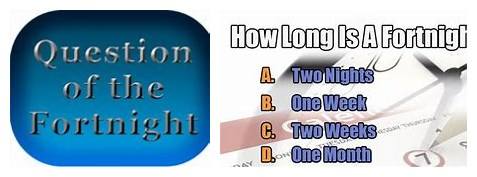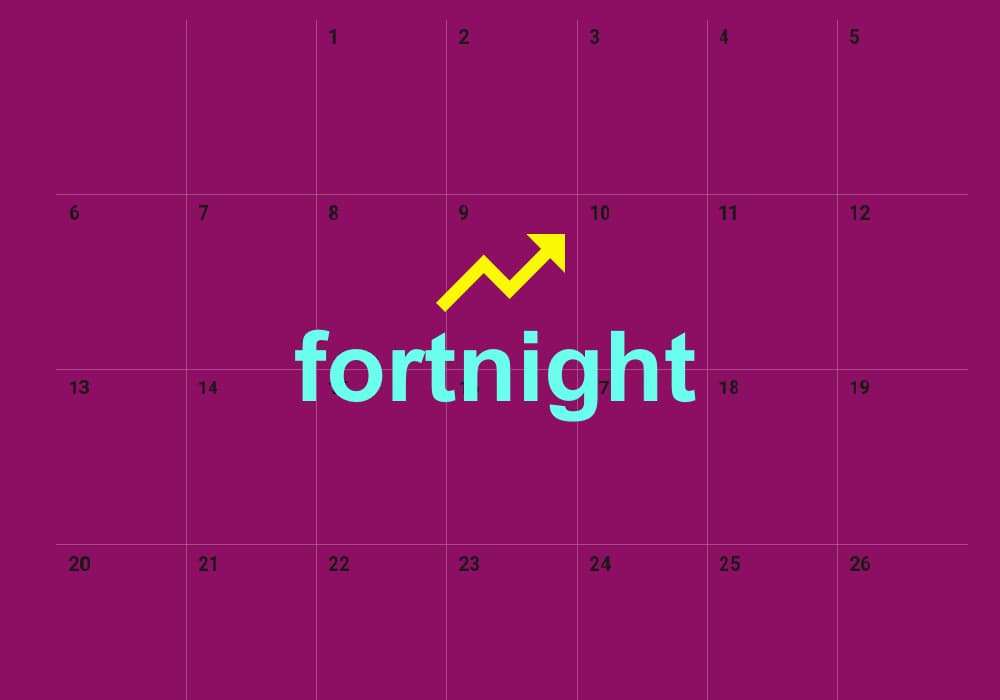How Long Is A Fortnight? Unpacking This Unique Time Period
Have you ever stumbled upon the word "fortnight" and, like, paused for a moment, wondering exactly what kind of time span it describes? It's a rather charming old word, you know, one that carries a bit of history with it. For many, especially those who live in England, or perhaps have visited the area, or just read a novel that uses old English, you may have come across this word referring to a duration of time, and it's pretty interesting to see how it works. Actually, understanding "how long is a fortnight" really helps you grasp a piece of language that's still very much alive in certain parts of the world today.
This particular word, "fortnight," often pops up in conversations or in books, especially if you're, say, in Britain or many Commonwealth countries. It's not just a number; it holds meaning not just in counting days but also in history and, you know, how we talk about time even now. So, if you've been curious about what this unique term really means for your schedule or your reading, you're definitely in the right spot to figure it out.
We're going to explore the simple truth behind this word, looking at its roots and how it's used today. You'll soon confidently know exactly what someone means when they mention a "fortnight," and you'll understand why this particular way of marking time has, like, stuck around for so long. It's really quite straightforward once you get the hang of it, and we'll break it down for you, basically.
- Sophie Rain Height In Feet
- Hannah Love Is Blind
- 405 Howard Street San Francisco
- Space City Home Network
- Ball Up Top Meaning
Table of Contents
- What a Fortnight Really Means
- The Historical Roots of "Fortnight"
- Where You Hear the Word "Fortnight"
- "Fortnight" in Practical Terms
- Related Words and Their Uses
- Frequently Asked Questions About "Fortnight"
What a Fortnight Really Means
So, let's get right to the heart of it: how long is a fortnight? It's pretty simple, actually. A fortnight is a period of fourteen days. That's it, plain and clear. You know, it's exactly 14 days, no more, no less, which makes it a very precise way to talk about time. This means if someone says they'll be away for a fortnight, you can pretty much count on them being gone for two full weeks.
To put it another way, a fortnight is two weeks. This connection is, like, super important for understanding the word. When you hear "fortnight," just think "two weeks," and you've got it figured out. It’s a duration that’s easy to picture once you connect it to the more commonly used "weeks."
The term describes a period of two weeks, or 14 days, and its charm in the English language is, like, timeless. This word, you know, really holds meaning not just in numbers but also in history and today, as a matter of fact. It’s a very specific measurement, always pointing to that fourteen-day span.
- Sophie Rain Spiderman Video
- Jackerman Mother Warmth
- Ap Classroom Unit 6 Progress Check Mcq Answers Ap Lang
- Securely Connect Remoteiot Vpc Raspberry Pi Aws Server
- Pam Bondi Have Children
You can also ask yourself, you know, how long is a fortnight in years? One fortnight equals 14 days, which is two weeks. Therefore, one fortnight equals 14/366 days in a leap year like 2012, or about 0.04 years. So, it's a relatively short period when you look at it that way, basically.
The Historical Roots of "Fortnight"
The word "fortnight" has a pretty cool story behind it, you know, tracing back to old English. It comes from the old English "feorwertyne niht," which, in a way, means "14 nights." This origin really helps you understand why it refers to a fourteen-day period. It's, like, a direct translation of its ancient form.
The term "fortnight" came about because it's a condensed version of its definition, basically. It's a neat little linguistic shortcut. Instead of saying "fourteen nights," people started saying "fortnight," which is, you know, much quicker and easier to say. This kind of word shortening is pretty common in language development, actually.
The word "fortnight" also comes from the Middle English word "fourteniht," which is a contraction of the earlier form. This shows how the language, you know, slowly evolved over time to give us the word we use today. It's a testament to how words change and adapt, making them simpler to speak and write.
So, whenever you hear someone refer to a fortnight, you can confidently know that it means "fourteen nights" in its oldest sense. This old English word comes from "fēowertyne niht," which means fourteen nights. It's a pretty direct lineage, really, from its very, very early beginnings to its current usage.
Where You Hear the Word "Fortnight"
If you live in England, or have ever visited the area, or perhaps just read a novel that uses old English, you may have come across the word "fortnight" referring to a duration of time. It's a commonly used word in Britain and many Commonwealth countries, you know, so it's not at all unusual to hear it there. It's just part of the everyday language, basically.
For example, people might say they are going on a vacation for a fortnight. This is, like, a very typical way to use the word in those regions. It's a natural fit for talking about plans that span two weeks, which is, you know, a pretty common length for a trip or a break.
In the United States, however, the term "two weeks" is more common. While people in the U.S. would understand what a fortnight means, they would typically just say "two weeks" instead. So, it's a bit of a regional difference in how people talk about this specific time period, actually. This means if you're talking to someone from, say, London, they might use "fortnight" quite naturally, whereas someone from, like, New York would probably stick to "two weeks."
The number fourteen, here, is more than just another way to gloss how long two weeks is, though. It has a bit of a cultural resonance in places where it's used regularly. It's a word that, you know, just feels right in certain contexts and conversations, giving a bit of character to the language.
"Fortnight" in Practical Terms
A fortnight is, as we've discussed, fourteen days, or two weeks. This is, like, a very practical measure of time. If you think about, say, planning something, knowing it's a fortnight gives you a clear picture of the duration. It's a very useful chunk of time for scheduling, actually.
Consider this little thought experiment: if it takes a man a week to walk a fortnight, it would take him two weeks to walk a month. This example, you know, really highlights the relationship between these different time units. It shows how a fortnight fits into the larger scheme of things, like weeks and months, which is, you know, pretty neat.
So, if someone tells you they have a project due in a fortnight, you know exactly how much time they have: fourteen days. This clarity is, you know, one of the reasons the word has persisted. It's a very precise way to communicate a time frame without any ambiguity, basically.
The term ‘fortnight’ describes a period of two weeks (or 14 days), and its charm in the English language is, like, timeless. This word holds meaning not just in numbers but also in history and today, you know, showing its enduring usefulness. It's a simple, yet effective, way to talk about a specific duration.
You know, it's a pretty straightforward concept. A fortnight is 14 days. There's also, like, a game that is commonly played, too, but that's a different thing altogether, basically, and not related to the duration of time we're talking about here. So, just to be clear, when we say "fortnight," we're talking about that period of two weeks.
Related Words and Their Uses
When you hear "fortnight," you might also come across some related words, too, which is, like, pretty natural for many terms in English. Related words are "fortnights" and "fortnightly." These words help extend the concept of a fortnight into different grammatical uses, you know.
"Fortnights" is, obviously, the plural form. So, if you're talking about several two-week periods, you would say "several fortnights." This is, like, pretty much how plurals work for most nouns, so it's not too surprising, basically.
Then there's "fortnightly." This word means something that happens every fortnight, or every two weeks. For example, a "fortnightly meeting" would be a meeting that takes place every fourteen days. It's a very useful adjective or adverb for describing recurring events, actually, which is, you know, pretty common in work or personal schedules.
These related terms really show how the core idea of a fourteen-day period can be, like, integrated into different parts of speech. It's a way the language makes the concept more flexible and useful in everyday communication, which is, you know, quite clever when you think about it.
Understanding these related words helps you, like, fully grasp the family of terms that come from "fortnight." It's not just about the duration itself, but also about how that duration influences how we describe events and patterns over time. So, if you see "fortnightly," you'll know it's about something happening every two weeks, which is, you know, a pretty clear meaning.
Frequently Asked Questions About "Fortnight"
Is a fortnight exactly 14 days?
Yes, absolutely, a fortnight is exactly 14 days. It's a very precise measure of time, you know, meaning two full weeks. There's no, like, ambiguity there at all, which is pretty helpful when you're trying to figure out durations, basically.
Why do they call it a fortnight?
The word "fortnight" came about because it's a condensed version of its definition, you know, tracing back to old English. It's from "feorwertyne niht," which literally means "14 nights." So, it's, like, a historical shortcut for that specific duration, which is pretty cool.
Is "fortnight" used in the United States?
While people in the United States would, like, generally understand what a fortnight means, the term "two weeks" is much more commonly used there. In Britain and many Commonwealth countries, however, "fortnight" is a very regular part of conversation, you know, so it's a regional difference, basically.
So, there you have it, you know, the full story of "how long is a fortnight." It's a period of fourteen days, or two weeks, rooted deeply in the history of the English language. From its Old English origins as "feorwertyne niht" to its common use in Britain today, it's a charming and very precise way to talk about time. Understanding this word not only helps you with your reading and conversations but also, like, connects you to a bit of linguistic heritage. You can learn more about time measurements on our site, and perhaps even discover more about historical English terms and their fascinating journeys through time, which is, you know, pretty interesting to explore. So, next time you hear "fortnight," you'll know exactly what it means, which is, you know, a pretty good thing to confidently know.
- King Edward Love Chair
- What Is A Golden Birthday
- How To Ripen Avocados
- Point Of View Skin Care
- How Did Mr Beast Get Rich

How Long is a Fortnight | Actforlibraries.org

40+ How Many Seasons In Chapter 2 Fortnite - KelanLeigha

What Is The Difference Between "Fortnite" And "Fortnight"? - Dictionary.com